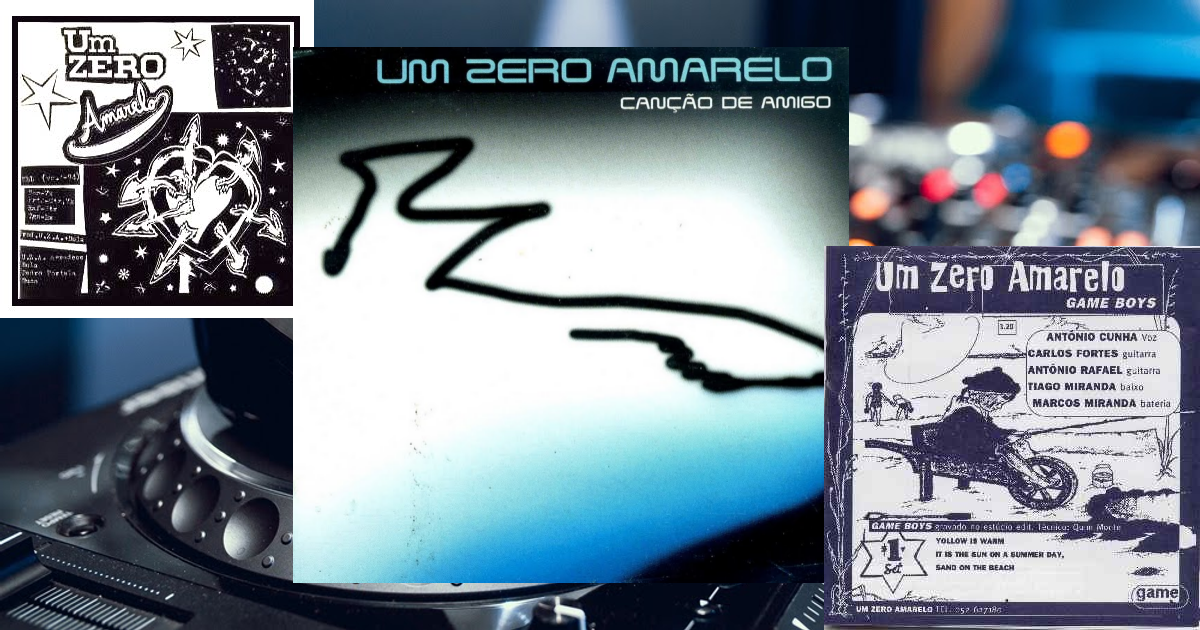Um Zero Amarelo were born in Braga, in 1992, almost unintentionally. They were three friends who came together to play a handful of cover songs that had marked them, both as listeners and as musicians. More than a band with defined goals, it was a space for relaxation, a parallel refuge from the artistic obligations they already had: Carlos Fortes (guitar) and António Rafael (bass) with Mão Morta, and António Cunha (vocals) with Rua do Gin. Their first concerts naturally took place in local bars, but the positive reception encouraged them to perform more often and, little by little, to take the risk of writing their own material.
Those performances also had a practical effect: they allowed the band to invest in better equipment and to build a solid foundation for exploring new sounds. The first original compositions began as a kind of testing ground, far removed from the aesthetic universe of Mão Morta or Rua do Gin, and soon revealed an unexpected potential. It was the true beginning of a discreet yet promising adventure, one that few knew the details of, but in which more and more people began to believe. Starting with the band themselves, who quickly earned a status of their own.
The key to Um Zero Amarelo’s affirmation lay in the strong emotional charge of their music, capable of conveying a very personal and unconventional vision. Their intense stage presence grew steadily in consistency and recognition, filling countless venues across the country with the density and expressiveness of their sound. The arrival of Tiago Miranda (bass) and Marcos (drums) — both from the Guimarães project Dionisus Jr., later Loosers — allowed António Rafael to move to second guitar, further expanding the band’s sonic possibilities.
Another distinctive feature of the group was the way they worked with words. Um Zero Amarelo’s lyrics displayed a rigorous metric and a rare clarity, addressing a peculiar and universal kind of solitude. Writing and singing in Portuguese has always been considered a challenge, yet the band broke down prejudices and demonstrated a unique poetic capacity. Their songs intertwined melodic, sometimes tortuous lines in a symbiosis of contradictory emotions, where music and text found an almost organic balance.
Naturally, voices soon began to demand a proper record that could capture this universe. Up to that point, the band had already recorded three demos, as a way of preparing for studio work, as well as a live session for Rádio Universitária do Minho, which was enthusiastically received. Their recognition grew further with the inclusion of tracks in compilations such as À Sombra de Deus and 100%, where they stood alongside some of the best alternative music being made in Portugal at the time.
Over their career, Um Zero Amarelo also secured important appearances, such as opening the Portuguese concerts of Gene Loves Jezebel and Inspiral Carpets, in addition to countless shows across the country. By 1998, they were already regarded as one of the most solid promises of the national rock scene, with a path that combined authenticity, intensity, and a rare poetic sensibility. For all these reasons — and for many more that each listener will discover for themselves — it is inevitable that, sooner or later, Um Zero Amarelo will become one of your greatest passions.











Um Zero Amarelo surgiu em Braga em 1992 como um projeto informal de amigos ligados a bandas como Mão Morta… Read more »
A música portuguesa é muito rica, difícil escolher apenas 20 canções. Mandou bem na lista.
boa seleção. vitorino e zeca afonso não poderiam estar de fora!!
They are nice songs
All the songs I love
Great passion and talent
Belles Chansons! Je commence a bien aimés les chansons portugaises